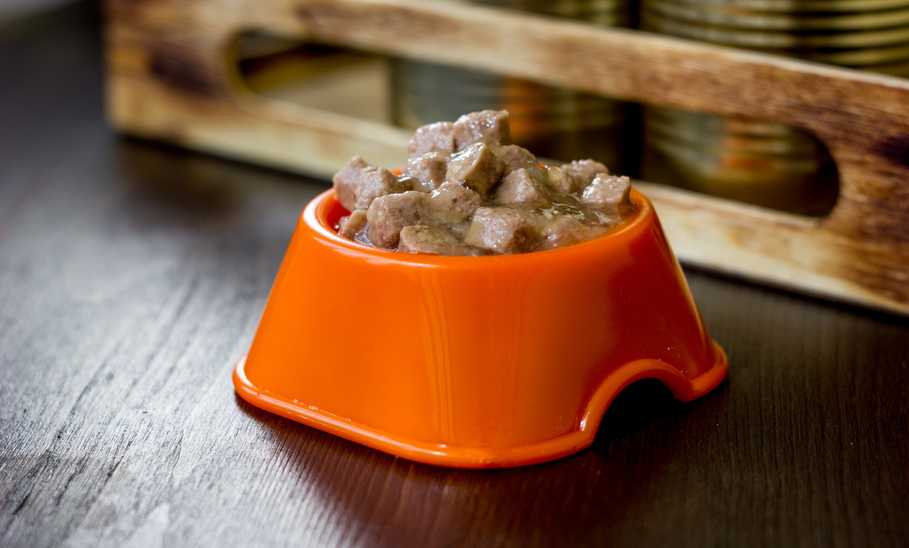Wet dog food has come a long way over the years, particularly with the development of fresh, human-grade food that can be shipped to your door. But should your dog be on wet food, or have some wet food incorporated into their diet? Ultimately, your veterinarian is the best resource to determine this, since they are familiar with your pet’s health. However, wet food is great for dogs who have no teeth or just a few teeth left. (I’m a big fan of food being chewed and not gulped down whole.)
Wet food also has significantly more moisture content, which can help with hydration. And dogs often find wet food more palatable. To give you an idea of the variety of wet foods available, I’ve rounded up my top picks for the best wet dog foods—both canned and fresh—for a variety of dogs, like puppies, dogs with allergies, seniors, and even picky eaters.
Our top picks for the best wet dog food
![[object Object] [object Object]](https://cdn.buttercms.com/tH2OpZFDSi66QvRzTYXv)
Nom Nom Turkey Fare
Nom Nom is a newer dog food company, founded in 2014, that offers four, gently cooked recipes for dogs. Their All Life Stages diets were formulated by board-certified veterinary nutritionists and are sold frozen, either as a subscription or through PetSmart. One of the reasons I like this food is because it doesn’t contain peas, chickpeas, lentils or dry beans. (It also made our list of the best senior dog foods.)These ingredients—also known as pulses—are being further researched, as they’ve been linked to some cases of canine diet-associated dilated cardiomyopathy (DCM), a type of heart disease. It also doesn’t contain potatoes or sweet potatoes, which are a lesser concern than pulses but are also being evaluated to see if they play a role in diet-associated DCM.
Specifications
- Main ingredients: Turkey, brown rice, eggs, carrots
- Life stage: All Life Stages
- Flavors: Turkey Fare, Beef Mash, Chicken Cuisine, Pork Potluck
- Package size: Custom sizes based on each pet
- Price at publish: $60-$70 per week for a medium to large dog
Pros:
- Meat is the first ingredient
- Can be tailored for needs like weight loss or weight gain
- Contains fish oil, a source of joint-supporting omega-3 fatty acids
- Contains carrots, a source of antioxidants like vitamin C and beta carotene
Cons:
- The standard recipe may be too much fat or protein for some senior dogs
- As a subscription, it may not suit everyone’s needs (however, you can delay or skip an order or cancel at any time)
The bottom line:
With clean ingredients, this easy to digest food is one of the best wet dog foods, and it can be fed as a meal or used as a topper.
![[object Object] [object Object]](https://image.chewy.com/is/image/catalog/88176_MAIN._AC_SS300_V1713298648_.jpg)
Blue Buffalo Basics Skin & Stomach Care Grain-Free Duck & Potato
This duck-based dog food for allergies is great for dogs who can’t tolerate chicken, turkey, lamb or beef. Though some dogs can have a duck allergy, it’s less likely than a chicken allergy.
One caveat though: this food contains pea protein and potatoes. Peas, chickpeas, lentils and dry beans—also known as pulses—are being further researched, as they’ve been linked to some cases of canine diet-associated dilated cardiomyopathy (DCM), a type of heart disease. Potatoes and sweet potatoes, though less of a concern, are also being further researched. These ingredients are particularly common in grain-free dog foods but can also be found in grain-containing foods.
Specifications
- Main ingredients: Duck, duck broth, potatoes, pea protein
- Life stage: Adult
- Flavors: Duck and Potato, Lamb and Potato, Whitefish and Potato, Turkey and Potato
- Packaging size: 12.5 ounce cans
- Price at publish: $54 for 12 cans
Pros:
- Duck is the first ingredient
- Contains nutrient rich blueberries and cranberries
- Contains omega-3 fatty acids, whose benefits include reducing inflammation, improving skin and coat health, and supporting the immune system
- Contains pumpkin, which is a source of prebiotic fiber for gut health
- Doesn’t contain chickpeas, lentils or dry beans
- No sweet potatoes
- Also comes in lamb, turkey and whitefish
- Made in the United States
Cons:
- Contains pea protein
- Contains potatoes
The bottom line:
This duck and potato based diet is a good option for dogs with sensitive skin or a sensitive stomach, who need to avoid chicken, turkey, corn, wheat, soy, dairy or eggs.
![[object Object] [object Object]](https://a.storyblok.com/f/125940/1200x1200/65f8cf6355/bone-ollie-cargill-ksphoto-013.png/m/1920x0)
Ollie Turkey Dish With Blueberries
This veterinarian-designed recipe is formulated for dogs of all life stages. It’s also human-grade, made in small batches and minimally processed. And it doesn’t contain any corn, wheat or soy. Ollie even packs these fresh meals by hand!
Specifications
- Main ingredients: Turkey, butternut squash, turkey liver, oats
- Life stage: All Life Stages
- Flavors: Chicken with Carrots, Beef with Sweet Potatoes, Turkey with Blueberries, Lamb with Cranberries, Pork with Apples
- Package size: Varies due to custom portion sizes
- Price at publish: $28-$56 per week depending on the size of your dog
Pros:
- Meat is the first ingredient
- Contains butternut squash, a source of prebiotic fiber for gut health
- Contains antioxidant-rich blueberries
- Contains fish oil, which is a source of omega-3 fatty acids
- No peas, chickpeas, or dry beans
- No potatoes or sweet potatoes
- Food can be stored in the freezer for up to six months
- Recipe can be customizable, such as for weight loss or weight gain
- Easier to chew for small dogs who may have had multiple teeth extracted
The bottom line:
If your small dog loves turkey, this nutritious fresh food is one to try, and it can be tailored for pets needing to gain or lose weight.
![[object Object] [object Object]](https://image.chewy.com/is/image/catalog/218311_MAIN._AC_SS300_V1712329753_.jpg)
Blue Buffalo True Solutions Jolly Joints
Jolly Joints offers large breed dogs a chicken-based food, which is a natural source of glucosamine and chondroitin. Though these two ingredients are beneficial for joint health, they don’t actually improve mobility (e.g. in dogs with arthritis) which is why this food is also supplemented with fish oil. Fish oil is a source of the omega-3 fatty acid, eicosapentaenoic acid (EPA). EPA is beneficial for canine cartilage and in proper amounts can improve mobility. Dog owners should talk with their veterinarian to determine how much EPA (and other joint health support) their dog requires. Shopping tip: Blue Buffalo also made our lists of the best dry dog foods and the best dog food brands.
Specifications
- Main ingredients: Chicken, chicken broth, whitefish, potatoes
- Life stage: Adult
- Flavors: Chicken
- Package size: 12.5 ounce cans
- Price at publish: $39 for 12 cans
Pros:
- Meat is the first ingredient
- Contains glucosamine and chondroitin
- Contains fish oil, a source of joint-supporting omega-3 fatty acids
- No chickpeas, lentils or dry beans
- No sweet potatoes
- No corn, wheat or soy
Cons:
- Only comes in one flavor
- Contains pea flour
- Contains potatoes
The bottom line:
This joint-supporting food is a good choice for large breed dogs who enjoy the flavors of chicken and fish.
![[object Object] [object Object]](https://image.chewy.com/is/image/catalog/741334_MAIN._AC_SL600_V1682103172_.jpg)
ACANA Premium Pate Puppy Recipe in Bone Broth
Though this dog food for puppies only comes in one flavor, it has great reviews on Acana’s website and on Chewy. It contains approximately 85% animal ingredients (exclusive of water), such as turkey and herring, but also contains produce such as carrots and blueberries. The high quality protein sources support a growing body and the inclusion of herring oil provides puppies with the omega-3 fatty acid DHA (docosahexaenoic acid), which is important for brain development.
Specifications
- Main ingredients: Chicken, chicken liver, chicken bone broth, sweet potatoes
- Life stage: Puppy (including large breed puppies)
- Flavors: Chicken
- Package size: 12.8 ounce cans
- Price at publish: $48 for 12 cans
Pros:
- First ingredient is chicken
- Contains nutrient-rich ingredients such as carrots, spinach and blueberries
- Contains pumpkin, which is a source of prebiotic fiber for gut health
- Contains herring oil, a source of omega-3 fatty acids
- No peas, chickpeas, lentils or dry beans
- Great reviews on Chewy (91% are 5 stars)
Cons:
- Only comes in one flavor
- Contains the mystery ingredient, “natural flavor”
- Contains sweet potatoes
The bottom line:
For puppies who like multiple flavors in their bowl, this food delivers, while also supplying the nutrition that growing pups need.
![[object Object] [object Object]](https://image.chewy.com/is/image/catalog/660550_MAIN._AC_SL600_V1664552268_.jpg)
Canidae Sustain Bone Broth Toppers
This topper contains minimal ingredients, such as cage-free turkey, making it a great food to mix in with dry because it won’t add a lot of calories. It is not a complete and balanced diet, so it shouldn’t be used as a meal. Toppers can be used to encourage a picky eater or they can be used for an animal who isn’t feeling well.
Specifications
- Main ingredients: Turkey bone broth, turkey, rice, rice starch
- Life stage: Adult
- Flavors: Turkey, Chicken, Salmon
- Package size: 5.5 ounce cartons
- Price at publish: $36 for 12 cartons
Pros:
- Only contains seven ingredients
- Made with cage-free turkey
- Contains carrots
- Made in the United States
Cons:
- Not suitable for dogs allergic to turkey
The bottom line:
This topper is a great way to add more flavor to your dog’s food without adding a lot more calories.
![[object Object] [object Object]](https://image.chewy.com/is/image/catalog/741446_MAIN._AC_SL600_V1681937675_.jpg)
Orijen Original Stew With Shredded Chicken, Turkey & Eggs
Orijen’s foods are based on the “whole prey diet,” so their ingredients include meat and organs. But their food also contains produce like carrots, broccoli and blueberries. This food might appeal to picky eaters because of its multiple flavor profiles, such as turkey, beef and lamb.
Specifications
- Main ingredients: Chicken, chicken bone broth, turkey bone broth, chicken liver
- Life stage: Adult
- Flavors: Chicken, Turkey & Eggs, Chicken & Eggs, Beef & Eggs, Beef, Duck & Lamb
- Package size: 12.8 ounce can
- Price at publish: $67 for 12 cans
Pros:
- Meat is the first ingredient
- Contains herring oil, a source of omega-3 fatty acids
- Contains pumpkin and inulin, which are sources of prebiotic fiber for gut health
- Great reviews and a 5 star rating on Chewy
- No peas, chickpeas, lentils or dry beans
- No potatoes or sweet potatoes
Cons:
- Contains the mystery ingredient “natural flavor”
The bottom line:
With its multiple sources of protein like chicken, turkey, and mackerel, this flavor-filled food might tempt your picky eater.
![[object Object] [object Object]](https://www.raisedrightpets.com/wp-content/uploads/2022/05/Original-Turkey-Adult-Dog-Recipe.png.webp)
Raised Right Turkey Adult Dog Recipe
With a single protein source, this gently cooked, human-grade food is a complete and balanced diet, simply through the use of whole foods. No synthetic vitamins or minerals are added. Raised Right was founded in 2016 and makes veterinarian-formulated foods for puppies, adult dogs, and adult cats (you’ll also see them on our list of the best wet cat foods).
Specifications
- Main ingredients: Turkey thigh, turkey heart, turkey liver, carrots
- Life stage: Adult
- Flavors: Turkey Recipe, Beef Recipe, Pork Recipe, Chicken Recipe, Turkey & Pumpkin Paté, Beef & Pumpkin Paté, Pork & Pumpkin Paté, Chicken & Pumpkin Paté
- Package size: 16 ounce package
- Price at publish: $176 for 16 packages
Pros:
- Meat is the first ingredient
- Single protein source
- Contains nutrient-packed ingredients like cod liver oil and blueberries
- Every batch of food is lab safety tested for pathogens
- Every ingredient is traceable back to its source
- Family owned company
- No peas, chickpeas, lentils or dry beans
- No potatoes or sweet potatoes
Cons:
- Requires overnight defrosting
- On the expensive side
The bottom line:
With its whole food philosophy, this easy to digest, nutrient-packed diet is made by one of the best dog food brands.
![[object Object] [object Object]](https://image.chewy.com/is/image/catalog/52029_MAIN._AC_SS300_V1719352205_.jpg)
Wellness CORE Grain-Free Weight Management
No dog likes to be on a diet but this paté style food is far from boring. With multiple meats like chicken, turkey and whitefish, this high protein food sounds more like a feast, while supporting overall wellness.
Specifications
- Main ingredients: Chicken, chicken broth, turkey broth, pork liver
- Life stage: Adult
- Flavors: Chicken
- Package size: 12.5 ounce cans
- Price at publish: $53 for 12 cans
Pros:
- Meat is the first ingredient
- Contains produce like apples, kale, blueberries and broccoli
- Contains prebiotic fiber for gut health
- Contains omega-3 fatty acids
- No chickpeas, lentils or dry beans
- BPA-free cans
Cons:
- Only comes in one recipe
- Contains peas
- Contains potato protein and sweet potatoes
The bottom line:
This low-fat, flavor-filled food will help promote weight loss while supporting your dog’s overall health.
![[object Object] [object Object]](https://image.chewy.com/is/image/catalog/120826_MAIN._AC_SS300_V1568927839_.jpg)
Instinct Limited Ingredient Diet Real Rabbit Recipe
A single protein, single carbohydrate food is the definition of a true limited ingredient diet, which this Rabbit Recipe is. (Not all diets claiming to be “limited ingredient" actually meet the true definition.) This rabbit-based recipe is easy to digest and it’s an alternative to the Blue Buffalo Duck and Potato that I discussed earlier for dogs with sensitive stomachs. I picked this food over the prescription diet, Royal Canin Selected Protein PR because rabbit is the first ingredient, not second as it is with Royal Canin, and Royal Canin’s food has “vegetable oil” as an ingredient.
Specifications
- Main ingredients: Rabbit, water, rabbit liver, chickpeas
- Life stage: Adult
- Flavors: Rabbit, Turkey, Lamb
- Package size: 13.2 ounce cans
- Price at publish: $68 for 12 cans
Pros:
- Meat is the first ingredient
- Contains a novel protein (i.e. one dogs usually haven’t previously consumed)
- Meets the true definition of a limited ingredient diet (not all do)
- Easily digestible
- No peas, lentils or dry beans
- No potatoes or sweet potatoes
- BPA-free cans
Cons:
- Contains chickpeas
- Mixed reviews, with some saying it’s too soupy
The bottom line:
If your pup has food sensitivities and needs a novel protein diet, this rabbit-based dog food for allergies is one to explore.
![[object Object] [object Object]](https://cdn.shopify.com/s/files/1/0016/2509/6305/files/PDP-Images-GC-Main-2023-Turkey-FOP_548x768_crop_center.png?v=1698631886)
Open Farm Homestead Turkey Recipe
This wet food contains human-grade ingredients like certified humanely raised turkey, and is made by one of the best dog food brands. Open Farm is a newer pet food company (founded in 2014) that is committed to transparency about their products. They produce premium dog and cat foods, available in dry, wet, raw and freeze dried raw.
Specifications
- Main ingredients: Turkey, kale, carrots, apples
- Life stage: All Life Stages
- Flavors: Chicken, Beef, Turkey, Surf & Turf (beef and salmon)
- Packaging size: 16 oz pouches that come in 8 or 16 lb boxes (sold frozen)
- Price at publish: $150 for 16 pouches
Pros:
- First ingredient is humanely raised turkey
- Contains salmon oil, which is a source of joint-supporting omega-3 fatty acids
- Contains nutrient-packed produce like carrots, kale and apples
- Contains butternut squash and pumpkin, sources of prebiotic fiber for gut health
- No corn, wheat or soy
- No peas, lentils, chickpeas or dry beans
- No potatoes or sweet potatoes
Cons:
- Might be more challenging to find locally but they offer delivery
- Price point may not be accessible to some
The bottom line:
Made with ethically sourced, human-grade ingredients, this premium product is one of the best wet dog foods, and it can be fed as a meal or used as a topper.
![[object Object] [object Object]](https://image.chewy.com/is/image/catalog/67780_MAIN._AC_SL600_V1689713150_.jpg)
Purina Pro Plan Complete Essentials Chicken & Carrots Entree
This grain-free, high protein diet has mostly great reviews online. Excluding vitamins and minerals, it has a surprisingly short list of ingredients and doesn’t contain pulses, potatoes or sweet potatoes.
Specifications
- Main ingredients: Chicken, water, liver, meat by-products
- Life stage: Adult
- Flavors: Beef & Chicken, Beef & Rice, Beef & Salmon, Chicken & Carrots, Chicken & Rice, Turkey & Sweet Potato
- Package size: 13 ounce cans
- Price at publish: $32 for 12 cans
Pros:
- Chicken is the first ingredient instead of a by-product
- Contains carrots, which are a good source of antioxidants like vitamin C and beta carotene
- No corn, wheat or soy
Cons:
- “Meat by-products” doesn’t clearly state what they are
- The only vegetable in it is carrots
The bottom line:
This protein-rich food can support your dog’s health while helping you mind a budget.
How we selected the best wet dog food
Quality
I selected foods based on the quality of ingredients, favoring meat as the first ingredient. Diets that support overall health and digestion, with ingredients like prebiotic fiber (e.g. from inulin, pumpkin or squash) and foods with omega-3 containing fish oils were additional factors I used. None of the diets I picked are formulated with corn, wheat, soy, artificial flavors or colors.
Labeling
The foods I chose are complete and balanced, and are from established brands. The diets meet the nutritional guidelines of the Association for the American Feed Control Officials (AAFCO) for the life stage for which they are labeled. Again, keep in mind that AAFCO doesn’t have nutritional recommendations for senior dogs.
Pulses and exotic proteins
Whether or not a food contained pulses—peas, lentils, chickpeas or dry beans—in the first three ingredients was a big factor in the foods I selected due to the FDA’s concern that, for some dogs, these ingredients may be linked with diet-associated DCM, a type of heart disease. Since more research is needed, I avoided exotic protein sources (e.g. kangaroo, buffalo, etc) for the same reason.
How much wet food to feed a dog
The amount of wet food a dog needs depends on multiple factors, so there isn’t one answer that will meet the requirements of all dogs. Some of these factors include a dog’s age, breed, activity level and medical history. For example, the caloric needs of a healthy, Great Dane puppy are going to be different compared to a senior labrador who has hypothyroidism and is trying to lose weight.
The caloric content of food also varies widely. Use the package label as an initial guideline but your veterinarian can instruct you to increase or decrease the quantity. Whether or not a dog is also receiving dry food needs to be accounted for.
All that said, it’s a good idea to know how much wet dog food you’ll be feeding your dog for every meal before you select one, as this can drastically change how much money you’ll be spending on the food (and therefore might impact your final decision).
How to choose the best wet dog food
Talk with your veterinarian
This is an absolute first step. One dog’s dietary needs may be significantly different than the next. Factors that need to be evaluated before selecting a food include—but are not limited to—preexisting medical conditions (the fresh food options may be too high in protein for dogs with certain diseases), body condition score (does my pet need to gain weight or lose weight?), dental health (can my dog comfortably chew dry food?), and fat content (does my dog have a history of pancreatitis?), to name a few.
Life stage
The wet food that you pick needs to be for the correct life stage. An important thing to note is that not all of the ‘All Life Stages’ diets are suitable for large breed puppies, so read the product label to see if they state that it is. And don’t rely on website summaries, because I have found misinformation, such as on Chewy’s website where the summary stated a food was acceptable for large breed puppies but the fine print on the package label said it was not.
Also, AAFCO (the Association of American Feed Control Officials) doesn’t have specific nutrient recommendations for senior dogs. That means that senior dog foods meet the AAFCO requirements for adult maintenance. This is all the more reason to discuss your senior pet’s nutritional needs with your veterinarian or a specialty veterinarian who is board certified in nutrition because some senior foods may not be the best for your pet. I discuss this in more detail in the Best Senior Dog Foods article, but to summarize, generally healthy senior dogs who don’t have a medical reason to be on a reduced protein diet, may do better on an adult food or an all life stages food.
Protein source
Look for foods where the primary protein source is from animals. Animal protein has a better amino acid profile for dogs and animal protein is also more digestible than higher fiber-containing plant proteins. This becomes more important as dogs age, which I discuss more in Best Senior Dog Foods.
Animal protein sources are also particularly important for puppies, especially large and giant breeds. It’s difficult to meet the high nutritional needs of growing dogs on plant-based diets, and trying to do so can cause permanent deformities. It’s fine for dog food to contain plants like fruits, vegetables and rice in them because dogs are omnivores. Fruits and vegetables are also a great natural source of nutrients.
Calories, fat and fiber
Calorie content, fiber and dietary fat are additional factors that need to be considered when selecting a food. Your veterinarian is the best person to provide guidance on this because nutritional needs vary from pet to pet. If you decide on fresh food, they tend to have less fiber, which may or may not be ideal for your pet. Fresh foods also tend to be higher in fat, but some of the brands can tailor the diets to some degree.
Nutrient levels: wet versus dry
When evaluating the percent of protein, fat and fiber on a canned food label (or pouch), keep in mind—because of the moisture content—these values don’t directly correlate to the values on dry dog foods.
For example, with the Open Farms Homestead Turkey that I covered earlier, the crude protein on an ‘as fed basis’ is 10.24% (min.). For this particular food, that corresponds to 42.66% on a dry matter basis. Dry matter basis is the percentage of nutrients when all moisture has been removed from a food. But to complicate things, dry dog food is not void of all moisture. It contains up to 14%. Canned food doesn’t tend to list both the ‘as fed basis’ level of nutrients and the ‘dry matter basis’, but there are dry matter calculators for pet foods, which can be found online.
A simpler way to compare wet food to dry is calories per cup, however that won’t be enough information if your pet’s protein, fat and/or fiber intake need to be between specific values due to medical reasons. Your veterinarian can also help you sort through pet food labels.
How long can wet dog food sit out?
If there is still wet food in your dog’s bowl after four hours, it should be discarded. And it’s a good idea to wash your pet’s bowl with hot, soapy water before placing more food in it at the next meal time.
How to store wet dog food after opening
Wet food in a can should ideally have a lid or foil placed over it to keep it from drying out, and kept refrigerated. Fresh foods that have been defrosted can be placed either in a Ziploc bag or a lidded container and kept refrigerated for three to five days. After that it should be discarded.
Frequently asked questions (FAQs)
What is the healthiest brand of canned dog food?
There is no single brand that can be considered the healthiest for all dogs. Each pet’s needs differ, so a brand that might work well for one dog may not work well for the next. For example, the standard recipes of fresh diets may be great for some growing dogs but they may be too much fat for a dog trying to lose weight, or too much protein for a dog who requires a reduced-protein diet due to a medical condition.
If you decide on fresh food, some of the companies can tailor it to your pet’s caloric needs. And what brand is best for your pet may change over time as their nutritional needs change.
Is wet dog food healthier for dogs?
Wet food does have benefits, but it may not be right for all dogs. For example, dogs who have a propensity for rapid tartar accumulation and need two dental cleanings a year may do better on a dry food, if they can comfortably chew it.
Wet food has significantly more moisture than dry food, which can help with hydration. And wet food tends to be more palatable, which can be helpful when feeding a picky pup. Talk with your veterinarian to determine if wet food should be a part of your dog’s feeding regimen.
What is the best wet dog food for healthy skin and coat?
There isn’t one wet food that will be optimal for all dogs. Some pups may have allergies to particular proteins, which can impact the health of their skin and coat. Look for foods with quality ingredients (the fewer the better, not counting vitamins and minerals,) foods that are complete and balanced, and appropriate for your pet’s life stage. Some dogs may even need a veterinary therapeutic diet (“prescription diet.”)
Foods that contain fish oil—a source of omega-3 fatty acids—can help support a healthy skin and coat. But foods vary with how much—if any—omega-3s they contain, so talk with your veterinarian about what food would be best, or if a supplement is needed.
What ingredients should I be looking for in good-quality wet dog food?
A quality wet food will contain animal protein, but because dogs are omnivores, it will also contain fruits and/or vegetables, which are good sources of antioxidants. If your pup is on a grain-inclusive diet, look for sources of carbohydrates like rice.
I also like to see fish oil in pet foods because it’s a good source of the omega-3 fatty acids eicosapentaenoic acid (EPA) and docosahexaenoic acid (DHA). Some of the benefits of EPA and DHA are that they support the health of the heart, joints, skin and coat. It's good to note that for dogs (and cats), fish sources of omega-3s are ideal. Though flaxseed oil contains omega-3s, dogs can’t convert much of it into EPA and DHA.
Are there any health benefits feeding my dog wet dog food?
Wet food can be beneficial for pets needing more moisture in their diet, like pets with medical conditions that cause dehydration. Wet food, especially the fresh diets, tend to contain more protein and fat, which can benefit dogs needing more of these nutrients in their diet due to reasons such as activity level or life stage, like puppies. The increased palatability of wet food can be helpful when feeding picky eaters.
Are there any potential risks feeding my dog wet food?
If your dog has a propensity for rapid tartar buildup, wet food may contribute to that problem. And due to the higher fat content of many (not all) wet foods, they can potentially be problematic for dogs who don’t tolerate much fat in their diet. Wet food also tends to be higher in protein. So depending on the specific food, it may not be suitable for dogs with a medical condition necessitating a reduced-protein diet.
If you’re buying fresh/fresh frozen food and are concerned about pathogens, look at the company’s website to read about pathogen safety testing. For example, Raised Right’s FAQ section says their low-temperature cooked food meets the USDA’s pathogen kill-step. On Open Farm’s website, they state that their food is tested by an independent third-party lab.


![[object Object] [object Object]](https://cdn.buttercms.com/tH2OpZFDSi66QvRzTYXv)
![[object Object] [object Object]](https://image.chewy.com/is/image/catalog/88176_MAIN._AC_SS300_V1713298648_.jpg)
![[object Object] [object Object]](https://a.storyblok.com/f/125940/1200x1200/65f8cf6355/bone-ollie-cargill-ksphoto-013.png/m/1920x0)
![[object Object] [object Object]](https://image.chewy.com/is/image/catalog/218311_MAIN._AC_SS300_V1712329753_.jpg)
![[object Object] [object Object]](https://image.chewy.com/is/image/catalog/741334_MAIN._AC_SL600_V1682103172_.jpg)
![[object Object] [object Object]](https://image.chewy.com/is/image/catalog/660550_MAIN._AC_SL600_V1664552268_.jpg)
![[object Object] [object Object]](https://image.chewy.com/is/image/catalog/741446_MAIN._AC_SL600_V1681937675_.jpg)
![[object Object] [object Object]](https://www.raisedrightpets.com/wp-content/uploads/2022/05/Original-Turkey-Adult-Dog-Recipe.png.webp)
![[object Object] [object Object]](https://image.chewy.com/is/image/catalog/52029_MAIN._AC_SS300_V1719352205_.jpg)
![[object Object] [object Object]](https://image.chewy.com/is/image/catalog/120826_MAIN._AC_SS300_V1568927839_.jpg)
![[object Object] [object Object]](https://cdn.shopify.com/s/files/1/0016/2509/6305/files/PDP-Images-GC-Main-2023-Turkey-FOP_548x768_crop_center.png?v=1698631886)
![[object Object] [object Object]](https://image.chewy.com/is/image/catalog/67780_MAIN._AC_SL600_V1689713150_.jpg)



